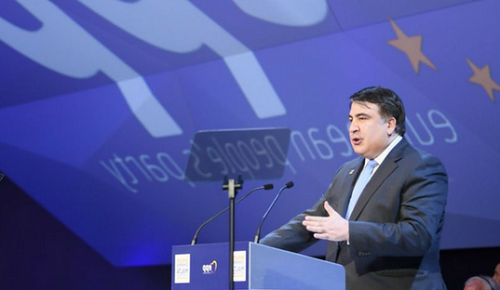| UNM, European Georgia at EPP Congress |
| Civil Georgia, Tbilisi / 31 Mar.'17 / 15:24 |

Ex-President Mikheil Saakashvili addressing the EPP Congress in Malta, March 29, 2017. Photo: Facebook
On March 29-30, some 2,500 delegates have gathered at the European People’s Party (EPP) Congress in Malta to debate a range of foreign and security policies affecting Europe, as well as economic development and social inclusion. Representatives of two Georgian opposition parties were also present. The United National Movement (UNM) has been an observer member since 2008, while the Movement for Liberty-European Georgia has split off from UNM and applied to become EPP observers this January.
Former Georgian President Mikheil Saakashvili, who represented the UNM in his capacity as the party’s honorary chairman, spoke at the Plenary Session under the “Non-EU Opposition Leader’s” segment on March 29.
Saakashvili began his speech by thanking EPP for “speaking very strongly” in favor of Georgia’s visa liberalization process. “Starting from yesterday, Georgian citizens can travel without visas to every European country. My government started the negotiations, we presided over them, we prepared them ... but we still could not believe until it happened,” Mikheil Saakashvili stated.
“It’s like a dream come true,” he added.
Calling his nine-year rule “the successful reform experiment in the Post-Soviet world,” Mikheil Saakashvili underlined that the United National Movement “managed to change the country beyond recognition and set examples for other countries in the region.”
“In 2012 we had one more proud achievement,” he went on. “For the first time in my country’s history we had a nonviolent, peaceful and democratic transfer of power to the next government.” “But the only problem,” Saakashvili added, was that the power was transferred “to the people who do not seem to happen to ever be ready to wield power peacefully again through reforms, through changes and through democracy.”
“Power was taken over by the biggest shareholder of Gazprom [Bidzina] Ivanishvili (Georgia’s former Prime Minister) and he proceeded to imprison all the main opposition leaders, to exile the others and I still cannot go back to my country,” ex-President explained.
Mikheil Saakashvili stated that the Government with the support of the international community “managed to stop Russia” in 2008, but four years later “the Russian oligarch and the Russian state applied … active measures, provocations, bribery, all the methods we see now all around the world ... and captured the power and the very Georgian state.”
“We had a capture of the state not through military means but through elections. And here we are in this situation, when we have formally a democracy, but what they achieved [is that] they killed the most daring reform experiment in post-Soviet space that challenged the very essence of Putin’s system and the Russian regime,” Saakashvili said.
“This is one of the biggest challenges we have now to the European democracies,” Mikheil Saakashvili argued, referring to the “capture of power” by oligarchs in countries such as Georgia and Moldova. “This is an overall threat that menaces the very core of values for which we stand.”
“I think freedom is freedom everywhere, in all parts of the continent, democracy means democracy, elections mean elections, freedom of expression means freedom of expression everywhere … [and] as the most value-based political family of the European continent … we really count on you as a family to raise your voice for our values,” Saakashvili concluded.
MP Gigi Tsereteli, member of the Movement for Liberty-European Georgia, spoke at the Plenary Session’s panel discussion on social inclusion on March 29.
According to Tsereteli, in order to establish inclusive societies it is “decisive to engage individuals in the processes by which the society is managed and represented.” “The main principles for inclusive society are respect for all human rights and fundamental freedoms, cultural and religious diversity, social justice and support for the needs of vulnerable and disadvantaged groups, democratic participation and rule of law.”
“Our policy frameworks must uphold and promote just and inclusive processes in all areas of implementation and equal access to basic education, public space, facilities and information must be ensured … One of the critical issues for the inclusive society is the fairness in distribution of wealth and resources,” MP Tsereteli said.
.@GTsereteli “Our policy frameworks must uphold and promote just and inclusive processes.” #EPPMalta #WeAreFamily
— EPP (@EPP) March 29, 2017
Speaking on the role of the OSCE, MP Gigi Tsereteli, who also serves as the Vice-President of the OSCE Parliamentary Assembly, stressed on the importance of defending the "spirit" of the Helsinki Final Act principles such as respect for sovereignty and territorial integrity of states. “This rock solid commitment of never to revise borders through force is one of the key priorities of the security architecture of Europe,” Tsereteli stated.
This rock solid commitment of never to revise borders through force is one of the keyprinciples of the sec.architecture of Europe #EPPMalta pic.twitter.com/YimbuD2ENr
— EPP_OSCEPA (@EPP_OSCEPA) March 30, 2017
Armenian President Serzh Sargsyan and Ukrainian President Petro Poroshenko also addressed the EPP Plenary.
